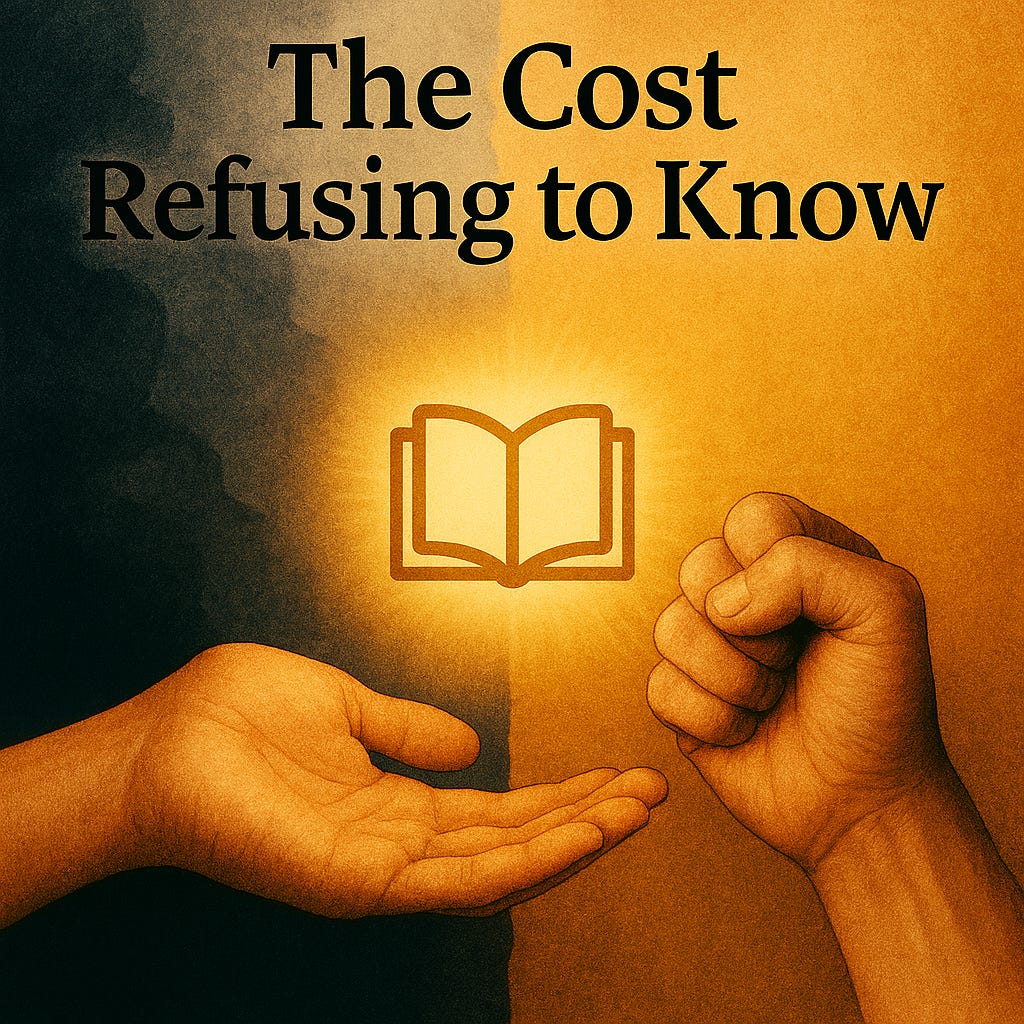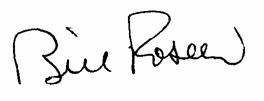The Cost of Refusing to Know
Open Hands and the Courage to See the Truth
There have been plenty of times I should have known better. Like when I bought penny stocks years ago; spoiler: I lost every cent. Or when I ditched the interstate for a ‘shorter’ route and showed up hours late. I knew better. But I didn’t want to be told what to do. I wanted to be right, on my own terms.
Sometimes admitting I am wrong doesn’t just sting, it makes me feel stupid. And I hate that. In fact, I contort myself to avoid that embarrassment to the point where I have doubled down on my misguided certainty. “If the road construction in Kentucky hadn’t been such a mess, I would have made it here hours ago.” Yeah, right.
These moments of stubbornness aren’t just personal quirks. They echo something deeper happening in our civic life, where refusing to know has become a kind of identity. It feels like every day, a Trump supporter is featured in an article talking about the thing that opened their eyes.
I turn to this phenomenon, not because I am immune to this mistake or that I feel above it but because people that I care about, and the country I care about, have been sold a story that flatters and fans fears and buries the truth. It’s because the President has, in my view, misappropriated the good will of millions, turning trust into a tool for division rather than unity. It’s because I am afraid that the dismantling of checks and balances may cut so deep as to sever the limbs of our Democracy, leaving us feeling dependent on the autocrat to survive at all.
Just as I once insisted on my own route, convinced I’d arrive faster, we now find ourselves on a national detour. Maybe it’s shorter, but also darker, and far more dangerous. And I fear the map was drawn this way on purpose.
The War Within: Cognitive Dissonance
Leon Festinger coined “cognitive dissonance” to describe the brutal tug when two conflicting truths collide. Picture your mind as a fortress of sandbags, each one packed with emotion, each one a barrier against any stray fact that threatens your certainty. Let even a single fact slip through, and the whole wall might crumble.
We build these walls because admitting contradiction feels more dangerous than error. If B challenges A, we don’t just call B false; we label it malicious. We fear not only being wrong, but being abandoned in our wrongness.
Festinger argued that modern life doesn’t punish us for error; it punishes us for our inability to hold contradiction. Can we let A and B coexist without our world collapsing around us? It Isn’t Just A and B, It’s the Authors of Both That Matter
I get it. Beneath the surface of dismissal lurks something raw and human: the ache of being condescended to, caricatured, or ignored. It’s not just about the argument, it’s about the feeling that the person making it doesn’t see you, doesn’t care to. That their words come preloaded with contempt.
But here’s the quiet tragedy: when we judge the validity of a claim solely by the perceived virtue or vice of its author, we risk turning every conversation into a proxy war for ultimate truth. We stop listening not because the facts are wrong, but because the speaker feels wrong. And in doing so, we trade the possibility of understanding for the comfort of tribal loyalty.
I’ve done it too. I’ve read something that challenged me, and instead of sitting with the discomfort, I scanned for clues: Who wrote this? What’s their angle? Are they one of “us” or one of “them”? And if they weren’t one of “us,” I found ways to discredit them, not because their argument was bad, but because it threatened mine.
So maybe the question isn’t just “Is this true?” but “Can I bear the truth if it comes from someone I don’t trust?” Or even more tenderly: “Can I allow myself to be changed by someone I’ve been taught to doubt, or fear, or even hate?”
Take Josh Smith, for example, the founder of Montana Knife Company, a booming business just outside Missoula. Smith built his brand from scratch, starting in his garage and growing it into a nationally recognized name in hunting knives. He’s also a vocal supporter of Donald Trump and MAGA policies, and in early 2024, he dismissed concerns about Trump’s proposed tariffs as typical “Trump-hater” fake news.
But then came expansion. To grow his business, Smith needed specialized equipment that was not made in the U.S. and was only available through import. Suddenly, the tariffs he had brushed off weren’t theoretical. They were real. And they were hurting his bottom line.
“It makes no sense,” he said. “I’m an American manufacturing business, the kind you want to promote. Why tariff what I need to grow?”
He had access to the information. But he rejected it out of hand, not because the facts were unclear, but because the sources felt untrustworthy.
And that’s the part that stings. Many of us tried to speak truth last year, about tariffs, deportation, Medicaid, lies. Not out of contempt, but out of concern. And yet, it often felt like some of our MAGA neighbors refused to believe certain truths not because they lacked information, but because accepting them would feel like surrendering to people they’ve been come to distrust.
I often heard neighbors defend lies as a way to ‘own the libs.’
Echoes of Distrust
If you read this and want to scream, “What else did you MAGA people need to see the truth?”, I get it. I’ve felt that scream rising in my own throat. And if you read this and think, “You have no credibility with me after years of going after Trump,” I get that too. The distrust runs deep, and it’s not one-sided.
Parents have a few stock phrases for kids who mess up. One of them is, “You never should’ve been there in the first place.” I feel that way about the country. We never should’ve gotten here.
My anger, my frustration, even my schadenfreude, is rational. But it’s not helpful. Those of us who saw this coming, who could’ve told Josh Smith what tariffs would do, have every right to feel vindicated. But vindication doesn’t build civic bridges. It doesn’t heal. It doesn’t change minds.
So maybe we punch a pillow. Maybe we scream into the void. And then we find a better way forward.
Empathy Over Victory
We all feel bitter. On both sides. But we’ve begun to treat suffering as proof of ideological failure. As if losing healthcare, or power, or dignity is a deserved punishment for voting wrong. But that’s not what America is supposed to be. It’s cruelty dressed up as righteousness. And it corrodes the very empathy democracy requires to survive.
When bad things happen to a neighbor, be it across town or across the country, my patriotic response must be to offer non-judgmental help, regardless of how that county or state or precinct voted last time. Donald Trump often signals that his concern is reserved for those who support him. That’s not leadership. It’s only transactional loyalty. Democracy demands something more of us: a willingness to extend care without conditions. That’s harder, especially when resentment runs deep. But Americans have long found ways to focus on solutions. Blame isn’t one of them.
Farmers should not suffer because US Aid is left to rot. I’m not a farmer, but I care about their well-being
Research universities should not be denied funding because they allow protests against Israel. I want research to continue, but I’m not a scientist.
Churches must never be banned or told what they can preach, even if I don’t believe what they preach.
I support farmers, universities, and churches not because I agree with everything they say, but because their freedom to say it makes my country stronger. In kind, I hope my neighbors can extend grace to immigrants, treat them as people first, however they arrived.
The cost of refusing to know isn’t just misinformation. It’s the erosion of empathy, the shrinking of our civic imagination. But knowing, really knowing, requires courage. The courage to listen, to reconsider, to extend grace even when it’s not returned.
That’s the America I try to live into, even when it disappoints me. One where truth matters to all of us, and where no one’s pain is used as proof of someone else’s righteousness.
We don’t have to agree on everything. But we can agree that suffering is not a victory. And that truth, held with grace, like an open hand extended, can still heal.



This might just be your best writing, ever. Your message needs to ricochet from coast to coast to foster grace. And let the healing begin.
Wow. Thank you again, Bill for your insights and your passionate defense of the truth.